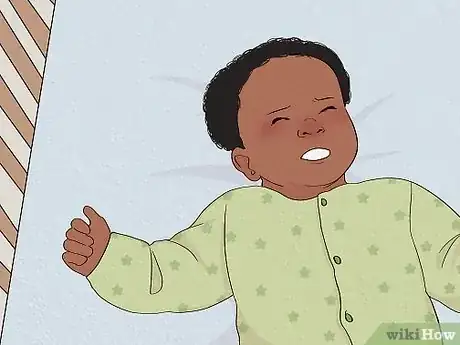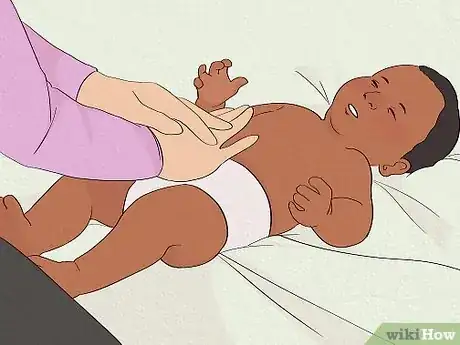This article was co-authored by Deanna Dawson-Jesus, CD (DONA). Deanna Dawson-Jesus is a Birth Doula, Childbirth, and Lactation Educator based in Danville, California. As the owner of Birthing Babies - A Celebration of Life, Deanna has 19 years of birth doula experience and has assisted with over 250 births. She also has over five years of postpartum doula experience and assists more than ten families. Deanna has additional extensive training in Assisted Reproductive Technologies, VBAC support, and Perinatal Loss Support. She is a Certified Birth Doula by DONA International and teaches at Blossom Birth and Family.
There are 8 references cited in this article, which can be found at the bottom of the page.
This article has been viewed 36,999 times.
Is your baby crying and you don't know how to calm them down? Having a screaming baby in the house is a parent's nightmare. You want nothing more than a calm, happy child, but your infant is having none of it. Luckily, there are plenty of ways to soothe your baby back into a calm state of mind.
Steps
Getting to the Root of the Crying
-
1Identify why the baby is crying. Are they hungry? Do they need a diaper change? Do they need to be burped? There are not that many reasons why babies cry—their world is limited to feeding, comfort, companionship, health, and sleep, so it shouldn't be hard to decipher their need. In general, the best order to follow would be to:
- Check their diaper.
- Feed them.
- Burp them over your shoulder.
- Take off their clothes and redress them in a new outfit in case the clothing was causing discomfort.
-
2Know that infants from 6-46 weeks old often have random bouts of crying. Unfortunately, there is little you can do. As long as you have a baby monitor, place the child in their crib and walk away. If the crying persists for more than 10-15 minutes, check back in to make sure nothing is wrong.
- If you've fed them, made sure they’re warm, burped them, and changed their diaper, then there is little more you can do. Go relax for a few moments and come back after they’ve gotten over their crying spell.[1]
Advertisement -
3Use a comforting, calming hold on the baby to instantly quiet them. This pediatrician-approved technique is a great way to calm a baby down no matter the circumstances.[2] It is often used after shots or other procedures that can quickly upset a small child.
- Tuck both of the baby's arms across their chest.
- Use your palm to secure the arms to the baby's chest.
- Grab the baby around the diaper, holding them securely.
- Gently rock and shake the baby with both hands, keeping them at a 45-degree angle.
- Make sure one hand supports their head and chin and the other has a firm hold between their legs.[3]
-
4Make sure that their clothes are loose and provide enough warmth. If you're cold in the house, chances are your baby is too. Make sure their clothes are loose enough that their skin can breathe, and that they are comfortably warm. If in doubt, it can't hurt to add another blanket and see how they respond.[4]
-
5Eliminate irritating foods from your diet that they may digest while nursing. Colic is when a baby cries for more than 3 hours a day, and it usually resolves itself by 3 months. You can, however, take steps to avoid excess crying due to colic by eliminating:
- Dairy
- Caffeine
- Onions
- Very spicy or irritating foods.[5]
-
6Check for a fever. Using a rectal or oral thermometer, see if your baby is running a temperature. This sort of discomfort will cause a baby to cry incessantly. If the baby is warmer than 100.3 °F (37.9 °C), (the average high for a normal baby), you should call your pediatrician immediately.[6]
-
7Keep calm and patient in the face of persistent crying. If you feel your patience snapping, have someone else take care of the baby, even if this means going to a neighbor and asking for help until you regain your composure. Take a good walk around the block to clear your mind and frustrations. Don't be surprised to find your baby calm upon your return; they often pick up on a parents' tiredness and distress.
- Never shake a baby—it can cause serious and life-threatening injuries.
- Many doctors suggest placing the baby in their crib and stepping out for a few minutes. Sometimes babies just need to cry for a little while.[7]
Calming Upset Infants
-
1Swaddle them in a warm blanket.[8] Swaddling is believed to create a tight, warm environment similar to the womb. Even snugly wrapping your little tyke in a blanket and holding them close to your chest should help quickly calm them down.[9] Get them warm and snug and start rocking.[10]
- You can lay the baby on their side after swaddling. It better mimics the feeling of the womb and calms them faster. Just be sure to maintain constant supervision if you place the baby on their side.
-
2Give them something to suck on. A pacifier or your finger is perfect. Sucking actually steadies a baby's heart rate, relaxes their stomach, and calms flailing limbs. This might be the ticket to a quiet, contented infant.[11]
-
3Sing a song or hum quietly under your breath. A gentle voice and simple rhythm are calming no matter what age you are. The gentle rhythm, combined with soft rocking and holding your child, should work. Any soft music will do.
- Try simple, gentle "shhh" sounds if you don't have a song in mind.
- Even white noise can have a calming effect on a baby—running water and vacuums can save even the most tone-deaf parent.[12]
-
4Pat the baby’s back. If your baby is crying while struggling to fall asleep, you can remind them that you’re there with gentle touch. Lightly pat the baby’s back or rub gentle circles between their shoulder blades. You could even hold their tiny hand in your own. Any of these option can help soothe a baby enough to stop crying.
-
5Walk around slowly in a dark area of the house. Walk at a slow steady speed. Babies love rhythmic motion, and the lack of light will slowly make them sleepy. If you can, go outdoors—the change to fresh air may help them calm down.
-
6Gently massage your baby's feet, hands, and stomach. Gentle, calming movements are all that matters. Babies love to be touched, so slow, consistent massaging might slow them down and quiet their lungs.[13]
-
7Play with your child to engage them. Play some peek-a-boo. Lie them on their back and rotate their feet like they were riding a bike. Make silly faces and talk to the child. Just being a distracting, stimulating influence may be enough to get them to stop crying. Babies need to be entertained, so entertain them![14]
-
8Call a hotline specifically for parents struggling with fussy babies. If you're out of options, it is time to look for help. The following numbers will help you calm down and provide potential solutions for your exact situation:
- 24-Hour Parent Helpline: 1-888-435-7553
- Crying Baby Hotline: 1-866-243-2229
- Fussy Baby Hotline: 1-888-431-BABY[15]
-
9Call your pediatrician if the baby is still crying after you've checked the obvious causes. If your baby won't stop screaming despite a clean diaper, full belly, and general comfort, you should call your pediatrician for advice. There is no reason to fear anything—but you should verify your specific situation with a professional.
- If the crying is high-pitched, random, and the baby seems tense, they may have colic, a crying disorder. Luckily, colic tends to go away by the time your baby is 12-14 weeks old.
- Note when a baby cries to find patterns—right before a nap, after waking up, after eating certain foods, etc. Pay attention to your baby's signals to prevent future outbursts.
- Baby's crying usually peaks around 6 weeks, but it eases off afterward.[16]
Expert Q&A
-
QuestionWhat to do when a baby is crying?
 Deanna Dawson-Jesus, CD (DONA)Deanna Dawson-Jesus is a Birth Doula, Childbirth, and Lactation Educator based in Danville, California. As the owner of Birthing Babies - A Celebration of Life, Deanna has 19 years of birth doula experience and has assisted with over 250 births. She also has over five years of postpartum doula experience and assists more than ten families. Deanna has additional extensive training in Assisted Reproductive Technologies, VBAC support, and Perinatal Loss Support. She is a Certified Birth Doula by DONA International and teaches at Blossom Birth and Family.
Deanna Dawson-Jesus, CD (DONA)Deanna Dawson-Jesus is a Birth Doula, Childbirth, and Lactation Educator based in Danville, California. As the owner of Birthing Babies - A Celebration of Life, Deanna has 19 years of birth doula experience and has assisted with over 250 births. She also has over five years of postpartum doula experience and assists more than ten families. Deanna has additional extensive training in Assisted Reproductive Technologies, VBAC support, and Perinatal Loss Support. She is a Certified Birth Doula by DONA International and teaches at Blossom Birth and Family.
Birth & Postpartum Doula, Childbirth, & Lactation Educator Birth & Postpartum Doula, Childbirth, & Lactation EducatorExpert AnswerIf you've already made sure all her needs are met, I would recommend swaddling her and holding her close to your chest. Babies feel most comfortable when they're held snugly. Hearing your heartbeat and breathing can also help calm her down.
Birth & Postpartum Doula, Childbirth, & Lactation EducatorExpert AnswerIf you've already made sure all her needs are met, I would recommend swaddling her and holding her close to your chest. Babies feel most comfortable when they're held snugly. Hearing your heartbeat and breathing can also help calm her down.
Warnings
- No matter how frustrated you are with baby, never shake them. It does irreparable damage in a few seconds; it also will not get the baby to stop crying. Find someone else to tend the baby until you feel calmer.⧼thumbs_response⧽
References
- ↑ http://time.com/4139408/robert-hamilton-the-hold-baby/
- ↑ Deanna Dawson-Jesus, CD (DONA). Birth & Postpartum Doula, Childbirth, & Lactation Educator. Expert Interview. 31 July 2020.
- ↑ http://time.com/4139408/robert-hamilton-the-hold-baby/
- ↑ http://www.parents.com/baby/care/newborn/ways-to-soothe-fussy-newborn/
- ↑ http://www.parents.com/baby/care/newborn/ways-to-soothe-fussy-newborn/
- ↑ http://www.babycenter.com/0_fever-in-babies_84.bc
- ↑ http://www.helpguide.org/articles/secure-attachment/when-your-baby-wont-stop-crying.htm
- ↑ Deanna Dawson-Jesus, CD (DONA). Birth & Postpartum Doula, Childbirth, & Lactation Educator. Expert Interview. 31 July 2020.
- ↑ Deanna Dawson-Jesus, CD (DONA). Birth & Postpartum Doula, Childbirth, & Lactation Educator. Expert Interview. 31 July 2020.
- ↑ http://www.mom365.com/baby/crying-and-soothing-baby/10-tips-to-soothe-your-crying-baby/
- ↑ http://www.babycenter.com/0_what-to-do-when-your-baby-cries-for-no-reason_10320516.bc
- ↑ http://www.babycenter.com/0_what-to-do-when-your-baby-cries-for-no-reason_10320516.bc
- ↑ Deanna Dawson-Jesus, CD (DONA). Birth & Postpartum Doula, Childbirth, & Lactation Educator. Expert Interview. 31 July 2020.
- ↑ http://www.childrenscolorado.org/wellness-safety/calm-a-crying-baby
- ↑ http://www.helpguide.org/articles/secure-attachment/when-your-baby-wont-stop-crying.htm
- ↑ http://www.helpguide.org/articles/secure-attachment/when-your-baby-wont-stop-crying.htm
About This Article
To calm your crying baby, first try to identify the reason they’re crying, such as needing their diaper changed, being hungry, or needing to be burped, which are the most common reasons babies cry. If your baby doesn’t need any of those things, try wrapping them in a warm blanket and rocking them by your chest to comfort them. You can also sing or hum to them while you rock them to create a soothing atmosphere. Another good way to relax your crying baby is to give them something to suck on, like a pacifier or your finger. If your baby won’t stop crying after you’ve checked all of the common causes, call your pediatrician for advice. For more tips from our Childcare co-author, including how to keep calm when your baby won’t stop crying, read on!







































































